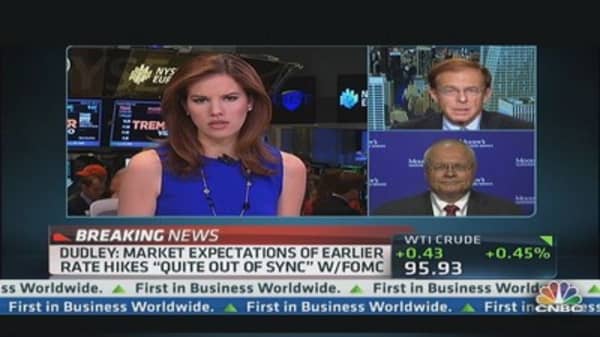The Federal Reserve's asset purchases would be more aggressive than the timeline Chairman Ben Bernanke outlined last week if U.S. economic growth and the labor market turn out weaker than expected, the influential head of the New York Fed said on Thursday.
Pushing back hard against market concerns over the withdrawal of quantitative easing, William Dudley stressed in a speech that the newly adopted timeline for reducing the pace of bond buying depends not on calendar dates but on the economic outlook, which remains quite unclear.
Turning to the question of when the Fed will ultimately raise interest rates, Dudley, a close ally of Bernanke, went so far as to say that recent market expectations for an earlier rate rise are "quite out of sync" with the statements and expectations of the policy-making Federal Open Market Committee.
"Economic circumstances could diverge significantly from the FOMC's expectations," Dudley told reporters at a briefing at the New York Fed's headquarters in downtown New York.
(Read More: Bernanke Bond Announcement Was Poorly Timed: Fed's Bullard)
"If labor market conditions and the economy's growth momentum were to be less favorable than in the FOMC's outlook — and this is what has happened in recent years — I would expect that the asset purchases would continue at a higher pace for longer," he said.
Speaking in Georgia, Atlanta Fed President Dennis Lockhart also emphasized that the economy's health will determine the pace of Fed bond buying. "There is no 'predetermined' pace of reductions in the asset purchases, nor is the stopping point fixed. The pace of purchases, the composition of purchases and the ultimate size of the Fed's balance sheet still depend on how economic conditions evolve."
Following a Fed policy meeting last week, Bernanke surprised markets by saying the central bank expected to reduce the $85-billion monthly pace of bond buying later this year and to end the QE3 program altogether by mid-2014, if the economy improves as expected.
Global markets have since fallen sharply, with yields on the 10-year U.S. Treasury spiking to near a two-year high.
Dudley, who has a permanent vote on monetary policy, repeated and backed the timeline Bernanke articulated last Wednesday.
But he appeared to want to bolster efforts by some of his Fed colleagues this week to calm investors' worries that less Fed accommodation will hurt the slow U.S. and global economic recovery.
The labor market, which the Fed is targeting with QE3, "still cannot be regarded as healthy," Dudley said, adding "there remains a great deal of slack in the economy."
He expects GDP growth of about 2.1 percent this year, about the same as it has been since the recession ended in 2009. But Dudley expects that to pick up next year.




